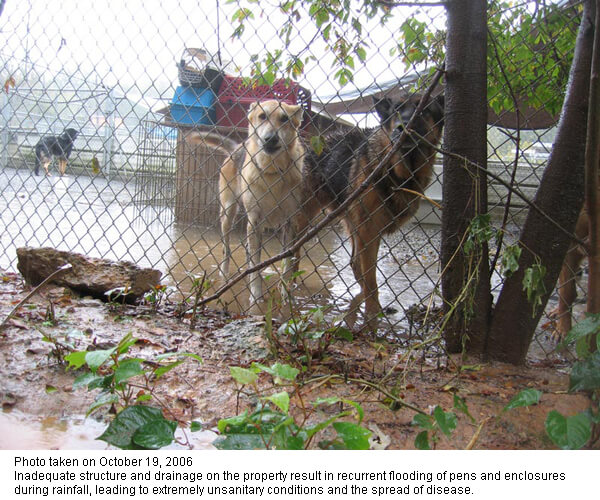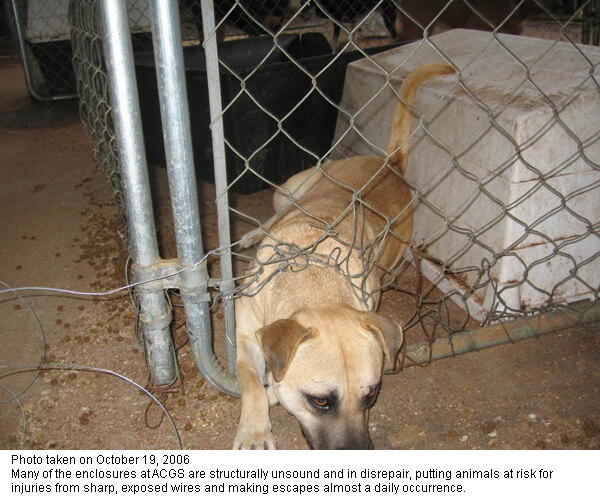North Carolina’s All Creatures Great and Small
Update: Shortly after the public release of PETA’s eyewitness investigation into All Creatures Great and Small (ACGS), the animals languishing at this facility got the help that they desperately needed. The North Carolina Department of Agriculture and Consumer Services launched Operation Move Out to transfer the remaining animals—almost 300 of them—to preapproved animal sheltering organizations and closed ACGS as a result of ongoing, persistent violations of the state’s Animal Welfare Act.
*****
For more than a decade, PETA fielded serious complaints from volunteers, employees, and visitors alleging cruelty and terrible neglect at ACGS—a “no-kill” shelter in Hendersonville, North Carolina.
Illness ran rampant among the estimated 400 dogs and 300 cats who were warehoused in an inadequate facility there. Animals sustained injuries daily—the majority of which were ignored, no matter how severe and painful they were.
PETA’s 2006–07 eyewitness investigation—spanning seven months—revealed blatant, ongoing violations of state animal protection laws, state and local health and environmental laws, state laws applicable to the solicitation of charitable contributions, and state laws applicable to the administration of state payroll and income taxes. In April 2007, representatives of PETA and the Animal Legal Defense Fund met with the North Carolina Department of Agriculture and Consumer Services (NCDA&CS) and presented extensive documentation of systemic animal abuse and neglect at ACGS.
Cruel Conditions Exposed
PETA conducted the investigation into ACGS from August 2006 to February 2007. Not much had changed since we first learned about the plight of animals there—if anything, things had gotten even worse.
Our investigator documented that animals were suffering physically and emotionally as a result of ongoing, systemic abuse and neglect. In addition, he observed that dogs, cats, and other animals were frequently left to languish in constant confinement and were deprived of veterinary care, in addition to suffering from a multitude of other atrocities.
Lack of Veterinary Care—Even for Severely Injured Animals
Among the dozens of untreated injuries documented by PETA’s investigator, some of the most severe cases were those of three dogs: Riley, Cinder, and Ms. Murphy.
Riley was attacked by another dog, who bit Riley’s tail off, leaving a bloody stump that eventually became infected. Riley’s only documented “treatment” consisted of isolation in a filthy room (ironically referred to as “The Penthouse” by staff), where he was hidden from public view and left to suffer from an open, festering wound that exposed his tailbone.
Cinder was also attacked by another dog, and her ear was nearly torn off. Cinder was discarded into the “laundry room” and, like Riley, never received care from a veterinarian for this wound.
Ms. Murphy sustained a crushed pelvis and a broken leg. After PETA’s investigator brought this existing injury to the attention of facility operator Kim Kappler, more than two weeks passed before the dog received any veterinary attention.
PETA’s investigator repeatedly alerted Kappler and other facility supervisors about the dire condition of these canines and others—but to no avail.

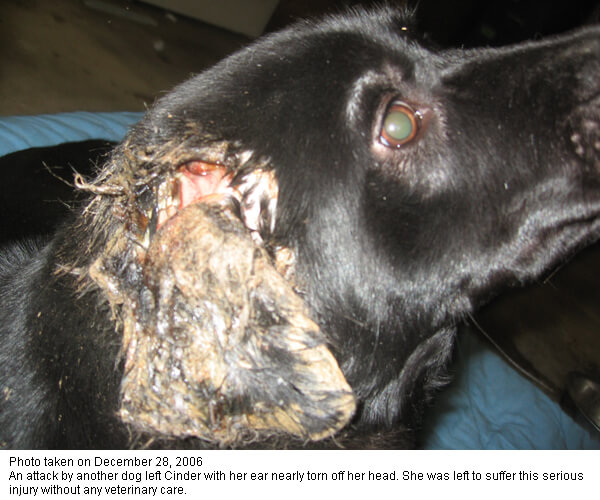
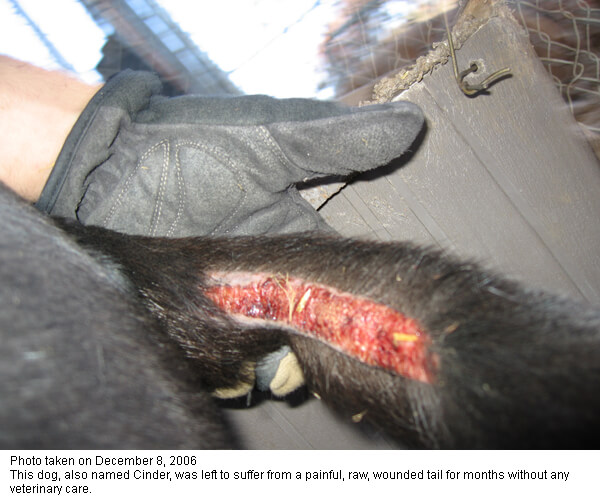
Inadequate Staffing and Structural Disrepair
During his employment at ACGS, PETA’s investigator observed that other paid staff were drinking alcohol and smoking marijuana while on duty and sitting idle—sometimes for hours—while the animals they were supposed to tend to languished in filth. A small handful of staff at ACGS—who aren’t all sober or willing to work—are expected to tend to nearly 700 animals. Staffing levels don’t allow for even minimally adequate care.
“Riley is in terrible condition. His tail is a bloody stump with the insides all hanging out. He seems to be in excruciating pain, and yet Kim [Kappler] does nothing about it. She does not give him any pain medication, nor antibiotics. She also refuses to take him to the vet.”—PETA’s investigator
Facility grounds were so overrun with rats that on one day, 11 dead rats were found in one outdoor pen. On another day, an employee was bitten by a rat as he tried to get the animal out of a cat cage!
During inspections in 2007, NCDA&CS inspectors found trash and debris strewn throughout the property. They noted that “untreated waste water piped from [a] toilet and washing machine into [a] large lagoon-like area” caused a noticeable odor throughout the facility.
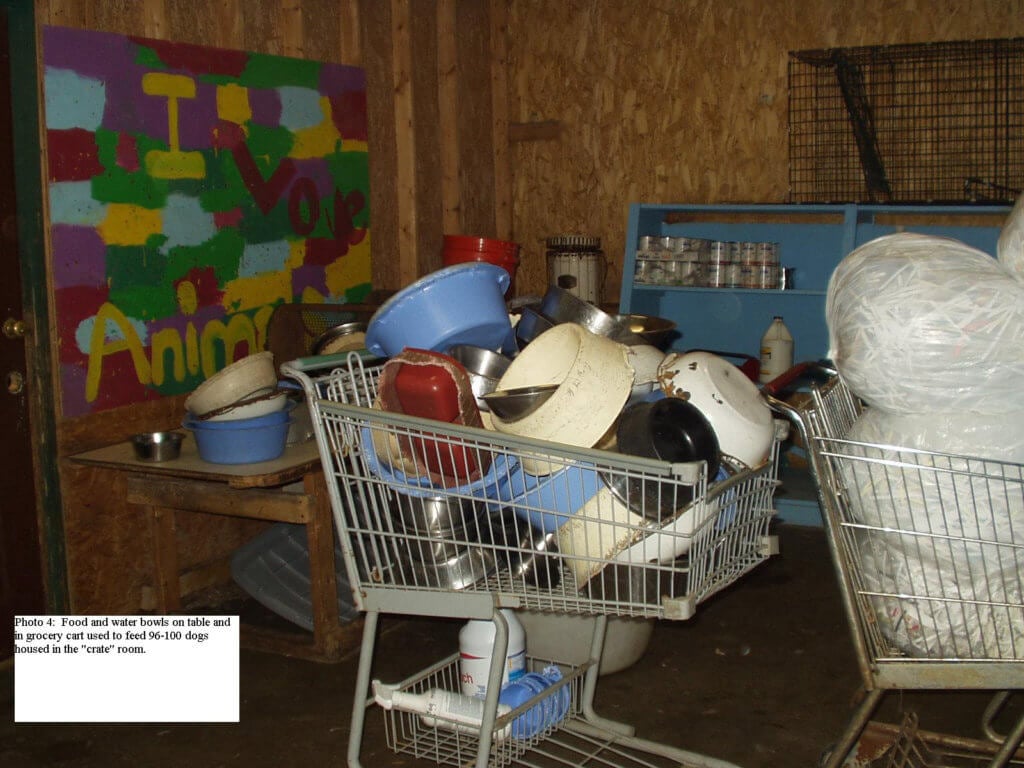
PETA’s investigator also noted many other types of abuse, including the following:
- Dogs, cats, and other animals languish in confinement almost constantly. Dogs confined to outdoor pens compete for shelter, as there is just one—or sometimes two—dilapidated plastic doghouse in most pens. Each pen usually houses three or four dogs.
- When it rains, the facility floods so severely that dogs housed in an area known as “The Hill” are trapped in standing water, mud, and debris.
- Dogs caged inside the facility are warehoused in stacked wire or plastic crates, often without any food or water (apparently in an effort to control the amount of urine and feces).
- PETA’s investigator documented that ACGS ran out of food on a regular basis when management was too broke or “too busy” to buy more, leaving hundreds of animals hungry.
- For dogs “stored” in the “Crate Room,” water is only offered when the animals are outside their crates. Because there are nearly 400 dogs, a handful of staff, a few volunteers, and—volunteers told PETA—only two leashes on the property, dogs in the “Crate Room” often don’t get to drink every day.
- Bored, frightened, and frustrated, dogs at the facility bark and struggle to get out of their cages. Many are forced to sit in and smell their own waste. The din of constant barking is deafening, with dogs housed next door to and sometimes in the same room as the cats.
- Dogs fence-fight incessantly and can bite and injure each other through kennel fencing. Dogs routinely break loose through holes in pens that are falling apart, and fights break out between dogs frequently—sometimes daily—whether the animals are loose or in designated pens. Most of the dogs, like Riley and Cinder, don’t receive veterinary care for their wounds.
- PETA’s eyewitness video caught ACGS staff members and even Kappler on tape as they admitted to hitting dogs with a shovel and kicking them in an effort to break up the frequent fights—a cruel and ineffective way to deal with the larger problem.
